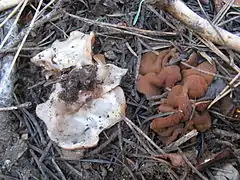Discina perlata
Discina perlata, commonly known as pig's ears is a brown to tannish, wrinkled, cup- or ear-shaped fungus, sometimes with short, stout stalk. The spores of D. perlata are quite similar to those of mushrooms in the genus Gyromitra, so that some mycologists classify it there.
| Discina perlata | |
|---|---|
 | |
| Fruit bodies of "Discina perlata" found in Eastern Shasta-Trinity National Forest, Siskiyou Co., California | |
| Scientific classification | |
| Kingdom: | |
| Division: | |
| Class: | |
| Order: | |
| Family: | |
| Genus: | |
| Species: | D. perlata |
| Binomial name | |
| Discina perlata | |
| Synonyms | |
| |
| Discina perlata | |
|---|---|
float | |
| smooth hymenium | |
| hymenium is decurrent | |
| stipe is bare | |
| spore print is brown | |
| ecology is saprotrophic | |
| edibility: not recommended or edible | |
Description
The cup measures 1⅝ - 4 in. (4 – 10 cm) wide; with a disc-like, whitish exterior, and a dark brown to tan interior. The cup is often wrinkled to convoluted, with the edges turned downward. The flesh is brittle. The stipe (when present) is ¼ - ⅜ in. (0.5 – 1 cm.) long and thick; it is brownish-tan in color.
It is considered inedible.[1]
Microscopic characteristics
The spores are 30 - 35 x 12 - 14 μm; Spindle shaped, minutely warted, with 3 oil drops and knobs at each end, located in the cup.
Similar species
Disciotis venosa is more deeply veined, and has smooth spores; it is typically found in deciduous woods. Other similar species of Discina must be differentiated microscopically.
Habitat and distribution
It is found singularly or in groups, on humus or rotten wood in coniferous areas; near melting snowbanks in western mountains. Its range is from Northeastern United States, Northwestern United States, and California. It comes into fruiting from May–July.
References
- Phillips, Roger (2010). Mushrooms and Other Fungi of North America. Buffalo, NY: Firefly Books. p. 364. ISBN 978-1-55407-651-2.
- Lincoff, GH National Audubon Society Field Guide to North American Mushrooms. Chanticleer Press, Inc. 1981 p. 331 ISBN 978-0-394-51992-0